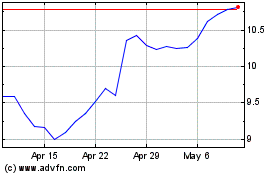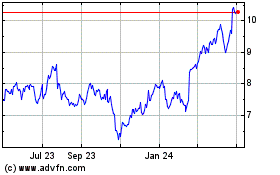Despite Loss, Barclays Chief Is Optimistic -- WSJ
February 23 2018 - 3:02AM
Dow Jones News
By Max Colchester
This article is being republished as part of our daily
reproduction of WSJ.com articles that also appeared in the U.S.
print edition of The Wall Street Journal (February 23, 2018).
LONDON -- Barclays PLC Chief Executive Jes Staley pledged
Thursday to more than double dividends at the loss-making British
bank, as the U.S. executive looks to appease disgruntled
shareholders.
The move came as the bank reported a GBP1.9 billion ($2.64
billion) net loss for 2017, compared with a GBP1.6 billion profit
the prior year, hit by a charge related to the U.S. tax overhaul
and poor returns at its investment bank's trading unit.
However, Mr. Staley said his turnaround plan is about to pay off
and that the return of volatility to markets was helping boost
trading revenue at the investment bank. "For the first time in five
years, the bank begins 2018 with a clear operating model," he
said.
Barclays said it would raise its dividend from 3 pence a share
to 6.5 pence a share this year, back to where it was two years ago
when it was cut to fund a restructuring at the group. Its shares
rose 4.4% in London.
The results come as Barclays is at a crossroads. After more than
two years of restructuring, Mr. Staley has now completed his
reshaping of the lender into a universal bank with major operations
in the U.S. and U.K.
However, Barclays was one of the worst-performing European bank
stocks last year, with shareholders questioning Mr. Staley's
decision to continue backing the bank's battered trading unit.
Investors now want to see how the businesses -- stretching from
credit cards to equity derivatives -- click together.
Sustained profits still look a ways off. The bank said on
Thursday that it would meet its cost of equity, around 10%, only by
2020.
Total income fell 2% on the year to GBP21.1 billion as the bank
shed operations. The investment bank continued to drag on results,
with markets revenue sliding 17% in the last quarter from the year
before.
Mr. Staley has been dealt a tough hand, analysts say. The
investment bank's trading business has struggled with record-low
levels of volatility. The Brexit vote has spooked investors,
worried that the U.K. economy could suffer, dragging Barclays's
sizable retail business with it. And analysts fret that the bank's
red hot growth in U.S. credit cards could see the bank burned if
the economic cycle there cools. Barclays on Thursday warned that
delinquencies on card payments in the U.S. were rising.
The first few months of the year, however, provided some hope
for the investment bank, as choppy markets prompted increased
client activity. Falling tax rates in the U.S. are expected to help
bolster returns, the bank said. Barclays previously disclosed it
was taking a $1.3 billion write-down on its 2017 accounts following
U.S. corporate tax cuts.
Going into 2018, Barclays still faces several legal hurdles,
including a criminal investigation into an emergency fundraising
during the financial crisis. The U.S. Justice Department is suing
Barclays, alleging it fraudulently sold more than $30 billion of
mortgage-linked securities that helped fuel the financial crisis.
Barclays has said it wants to settle the allegations but only at
the right price. Mr. Staley and the bank are being probed over
attempts to reveal the identity of a whistleblower that critiqued a
hire made by the executive. The bank put aside GBP240 million to
cover a foreign-exchange matter in the last quarter of the
year.
Write to Max Colchester at max.colchester@wsj.com
(END) Dow Jones Newswires
February 23, 2018 02:47 ET (07:47 GMT)
Copyright (c) 2018 Dow Jones & Company, Inc.
Barclays (NYSE:BCS)
Historical Stock Chart
From Mar 2024 to Apr 2024

Barclays (NYSE:BCS)
Historical Stock Chart
From Apr 2023 to Apr 2024
